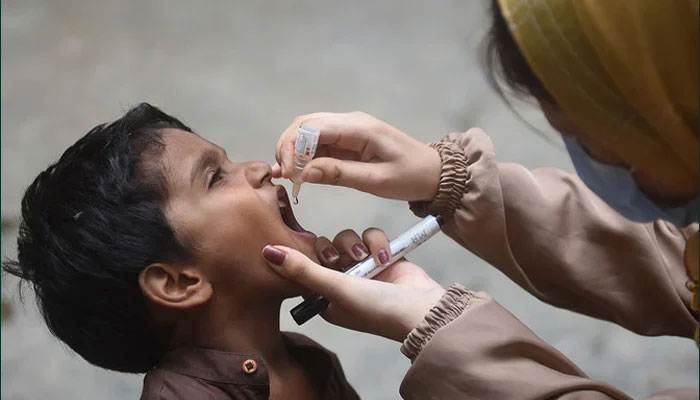Poliovirus found in 30 environmental samples across Pakistan
Wild Poliovirus 1 (WPV1) has been detected in 30 environmental samples collected from different cities of all four provinces of Pakistan
ISLAMABAD: Wild Poliovirus 1 (WPV1) has been detected in 30 environmental samples collected from different cities of all four provinces of Pakistan, officials in the Polio Eradication Initiative (PEI) Saturday said, adding that 28 of these environmental samples were collected in January 2024.
“The Regional Reference Laboratory for Polio Eradication at the National Institute of Health Islamabad has confirmed the detection of Type-1 Wild Poliovirus (WPV1) in 30 environmental (sewage) samples. Five of these samples were collected from district Quetta; four from district Karachi East; two each from districts Karachi Keamari, Karachi South, Chaman and Peshawar; and one each from districts Lahore, Rawalpindi, Dera Ghazi Khan, Karachi Central, Karachi Korangi, Karachi Malir, Hyderabad, Jamshoro, Sukkur, Pishin, Kech, Nasirabad, and Khuzdar” an official said.
According to the officials, 28 of these samples were collected in January 2024, while two were collected in December 2023.
In Quetta, environmental samples from collected from Jatak killi and Takhthani, Railway Pul, Surpul, Tawoosabad environmental sample collection sites. The isolated viruses are is classified as YB3A cluster and 99.5% genetically linked to the virus detected in an environmental sample in Kandahar (Afghanistan) on 21st May 2023.
In Khuzdar, the environmental sample was collected on 27th December 2023 from the ‘Katan Pul’ environmental sample collection site, which the first positive sample from District Khuzdar in 2023.
Wild poliovirus was also detected in the sewage from Rawalpindi’s ‘Dhok Dalal’, Dera Ghazi Khan’s Main Disposal, Lahore’s Outfall Station-G environmental sample collection sites. The isolated virus is classified as an ‘ORPHAN’ YB3A cluster and 98.34% genetically linked to the virus detected in an environmental sample in Jalalabad (Afghanistan) on 2nd April 2023. In Karachi East, the environmental samples were detected from the Sohrab Goth, Machar Colony, Rashid Minhas Road, Chakora Nullah environmental sites,
Similarly in Keamari, poliovirus was detected in the sewage of Orangi Nala and Muhammad Khan Colony and in Karachi South, poliovirus was found in Hijrat Colony and Manzoor Colony Nallah environmental sample collection sites. In Karachi Central, poliovirus was found in the sewage sample collected from Haji Mureed Goth.
In Korangi district of Karachi, poliovirus was found in the environmental samples collected from Korangi Nala while in Malir, poliovirus was found in the sewage from Landhi Bakhtawar Village Colony.
In Jamshoro, poliovirus was found from the sewage sample collected from Drain KB Feeder while in Hyderabad, poliovirus was found from the Latifabad Pumping Station environmental sample collection site. In Sukkur, poliovirus was detected in sewage sample collected from Makka Pumping Station environmental sample collection site.
In Chaman, poliovirus was detected in environmental samples from Army Kaziba and Hadi Packet environmental sample collection sites while in Pishin, poliovirus was detected from Turwa environmental sample collection site. In Kech, poliovirus was detected in sewage from Turbat Town environmental sample collection site. In Kech, poliovirus was found in sewage sample collected from Wapda Colony environmental sample collection site.
In Peshawar, poliovirus was detected from Naray Khuwar Palosi Pul and Shaheen Town environmental sample collection sites.
The two new detections bring the total number of positive environmental samples for 2023 to 126. While the total number of positive environmental samples for 2024 is 28.
-
 Nancy Guthrie Abduction: Piers Morgan Reacts To 'massive Breakthrough' In Baffling Case
Nancy Guthrie Abduction: Piers Morgan Reacts To 'massive Breakthrough' In Baffling Case -
 Adam Mosseri Set To Testify In Court Over Social Media Addiction Claims
Adam Mosseri Set To Testify In Court Over Social Media Addiction Claims -
 Will Warner Bros Finalize Deal With Paramount Or Stays Loyal With Netflix's Offer?
Will Warner Bros Finalize Deal With Paramount Or Stays Loyal With Netflix's Offer? -
 Palace Spotlights Queen Camilla For Her Work With Vision-impaired Children A Day After Andrew Statement
Palace Spotlights Queen Camilla For Her Work With Vision-impaired Children A Day After Andrew Statement -
 Kim Kardashian Still 'very Angry' At Meghan Markle, Prince Harry
Kim Kardashian Still 'very Angry' At Meghan Markle, Prince Harry -
 Texas Father Guns Down Daughter After Heated Trump Argument
Texas Father Guns Down Daughter After Heated Trump Argument -
 Andrew, Sarah Ferguson Quietly Adopts New Strategy To Control Public Narrative
Andrew, Sarah Ferguson Quietly Adopts New Strategy To Control Public Narrative -
 Harry Styles Refuses To Apologise For High Tour Ticket Prices In Rude Response: Source
Harry Styles Refuses To Apologise For High Tour Ticket Prices In Rude Response: Source -
 Ariana Grande Opens Up About ‘dark’ PTSD Experience
Ariana Grande Opens Up About ‘dark’ PTSD Experience -
 Angelina Jolie Says It Loud: 'Scars Define My Life'
Angelina Jolie Says It Loud: 'Scars Define My Life' -
 Climate-driven Wildfires Scorch Some Of World’s Oldest Trees In Patagonia
Climate-driven Wildfires Scorch Some Of World’s Oldest Trees In Patagonia -
 King Charles’ Ignorance Over Andrew & Jeffrey Epstein Not True? Foreign Office, MI6’s Work Comes Out
King Charles’ Ignorance Over Andrew & Jeffrey Epstein Not True? Foreign Office, MI6’s Work Comes Out -
 Police Detained 'innocent' Man In Nancy Guthrie's Kidnapping
Police Detained 'innocent' Man In Nancy Guthrie's Kidnapping -
 Co-founders Of Elon Musk's XAI Resigned: Here's Why
Co-founders Of Elon Musk's XAI Resigned: Here's Why -
 Dakota Johnson Reveals Smoking Habits, The Leading Cause Of Lung Cancer
Dakota Johnson Reveals Smoking Habits, The Leading Cause Of Lung Cancer -
 FAA Shuts Down El Paso Airport, Flights Suspended For 10 Days: Here’s Why
FAA Shuts Down El Paso Airport, Flights Suspended For 10 Days: Here’s Why




